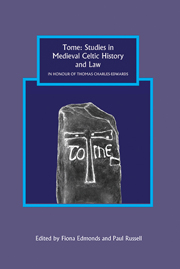Book contents
- Frontmatter
- Contents
- List of Illustrations
- Preface
- List of Contributors
- Abbreviations
- 1 Cloud-Cuckoo Land? Some Christian Symbols from Post-Roman Britain
- 2 Columbanus's Monasticism and the Sources of his Inspiration: From Basil to the Master?
- 3 Early Irish Priests within their Own Localities
- 4 Political Organisation in Dál Riata
- 5 Irish Boundary Ferta, their Physical Manifestation and Historical Context
- 6 Asser's Parochia of Exeter
- 7 Viking-Age Sculpture in North-West Wales: Wealth, Power, Patronage and the Christian Landscape
- 8 Iona v. Kells: Succession, Jurisdiction and Politics in the Columban Familia in the Later Tenth Century
- 9 A Twelfth-Century Indulgence Granted by an Irish Bishop at Bath Priory
- 10 Gerald of Wales, Gildas, and the Descriptio Kambriae
- 11 Patrick's Reasons for Leaving Britain
- 12 Learning Law in Medieval Ireland
- 13 Holding Court: Judicial Presidency in Brittany, Wales and Northern Iberia in the Early Middle Ages
- 14 The Iorwerth Triads
- 15 The Recovery of Stolen Property: Notes on Legal Procedure in Gaelic Ireland, Scotland and the Isle of Man
- 16 Contentious Kinship: The Penumbra of Established Kinship in Medieval Irish Law
- 17 Marriage by Purchase in Early Irish Law
- 18 Kingship Made Real? Power and the Public World in Longes Mac nUislenn
- 19 Mongán's Metamorphosis: Compert Mongáin ocus Serc Duibe Lacha do Mongán, a Later Mongán Tale
- Bibliography of the Writings of Thomas Charles-Edwards Maredudd ap Huw
- Index
- Tabula Gratulatoria
12 - Learning Law in Medieval Ireland
Published online by Cambridge University Press: 05 October 2013
- Frontmatter
- Contents
- List of Illustrations
- Preface
- List of Contributors
- Abbreviations
- 1 Cloud-Cuckoo Land? Some Christian Symbols from Post-Roman Britain
- 2 Columbanus's Monasticism and the Sources of his Inspiration: From Basil to the Master?
- 3 Early Irish Priests within their Own Localities
- 4 Political Organisation in Dál Riata
- 5 Irish Boundary Ferta, their Physical Manifestation and Historical Context
- 6 Asser's Parochia of Exeter
- 7 Viking-Age Sculpture in North-West Wales: Wealth, Power, Patronage and the Christian Landscape
- 8 Iona v. Kells: Succession, Jurisdiction and Politics in the Columban Familia in the Later Tenth Century
- 9 A Twelfth-Century Indulgence Granted by an Irish Bishop at Bath Priory
- 10 Gerald of Wales, Gildas, and the Descriptio Kambriae
- 11 Patrick's Reasons for Leaving Britain
- 12 Learning Law in Medieval Ireland
- 13 Holding Court: Judicial Presidency in Brittany, Wales and Northern Iberia in the Early Middle Ages
- 14 The Iorwerth Triads
- 15 The Recovery of Stolen Property: Notes on Legal Procedure in Gaelic Ireland, Scotland and the Isle of Man
- 16 Contentious Kinship: The Penumbra of Established Kinship in Medieval Irish Law
- 17 Marriage by Purchase in Early Irish Law
- 18 Kingship Made Real? Power and the Public World in Longes Mac nUislenn
- 19 Mongán's Metamorphosis: Compert Mongáin ocus Serc Duibe Lacha do Mongán, a Later Mongán Tale
- Bibliography of the Writings of Thomas Charles-Edwards Maredudd ap Huw
- Index
- Tabula Gratulatoria
Summary
One of the many subjects on which Thomas Charles-Edwards has immeasurably broadened our understanding over the years is that of early Irish legal education. Through his work we have been invited to contemplate not merely what, but how, budding lawyers were being taught in the schools. No tract addresses the issue of instructional method specifically; however, given the traditional understanding of the extant law tracts as textbooks for junior jurists, it seems only reasonable to imagine that one might be able to infer something about this from the texts that remain. Particularly difficult to reconstruct from this distance are the oral aspects of early legal instruction, though one tract in the corpus has always seemed to me especially promising in this respect. Berrad Airechta, an early-eighth-century tract on suretyship and contract (and the first text I ever read with Professor Charles-Edwards thirty years ago at Oxford), is well known among specialists for the large amount of purportedly oral material it contains. Not only is it one of our most important sources for sayings attributed to the traditional oral law known as Fénechas, but at the core of the tract are replicated what purport to be the ritualised oral exchanges used by creditor and debtor in contracting obligations. Equally intriguing are the ten quotations not ascribed to Fénechas but introduced in the text by expressions such as is de asberr, ‘it is regarding this that this is said’, or cid dia nepir, ‘why is this said?’
- Type
- Chapter
- Information
- Tome: Studies in Medieval Celtic History and Law in Honour of Thomas Charles-Edwards , pp. 135 - 144Publisher: Boydell & BrewerPrint publication year: 2011

